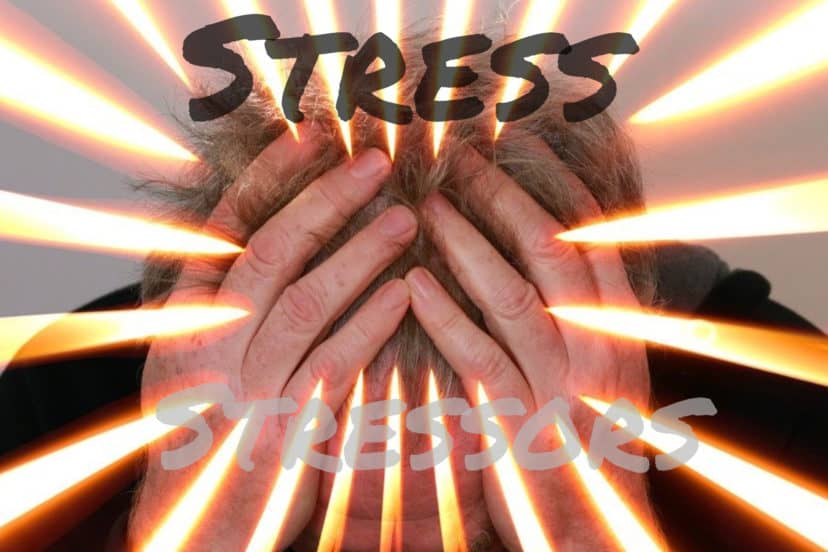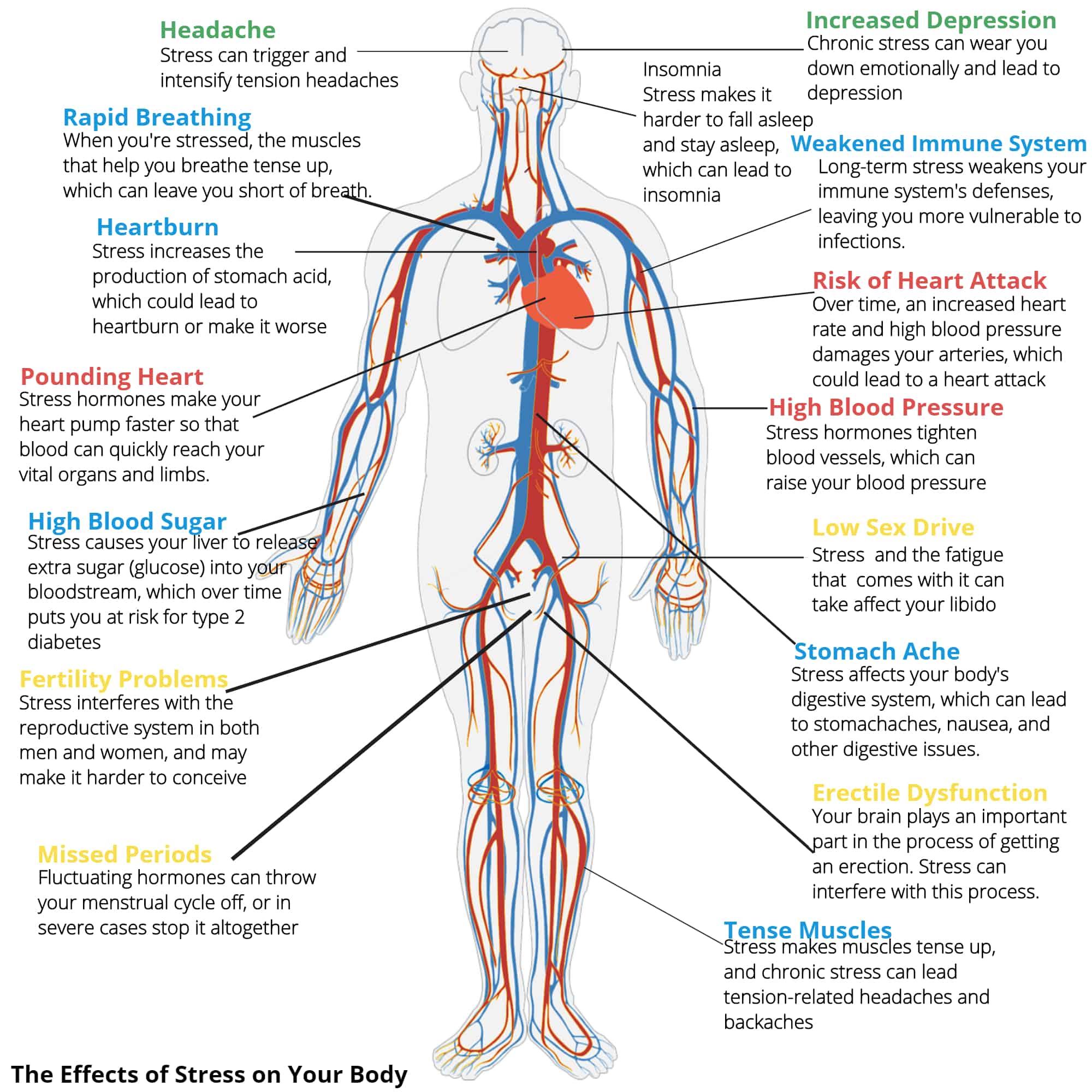Stress and What You Need to Know

In the past few days, I find myself on edge, stressed out. Personal issues, work, and business concerns, thoughts about how the Dow Jones Industrial Average fell 2,352 points, or nearly 10% — the biggest one-day drop since 1987, the constant news of people getting sick, pubic events, schools being canceled, groceries running of toilet paper, hand sanitizers, soaps. And then have to go to work in the hospital. It’s no wonder why I am stressed and everybody as well.
But as with everything, it’s all about perception and how we control our minds. I need to understand how to put everything in its proper perspective and know-how to control my mind. I need to understand what stress is and what it does to our bodies. I believe that when we know and have the proper information, we can deal with stress better. So let’s dive in.
What is Stress?
Stress is how the brain and body respond to any demand, any type of challenge, any change in our routine, or when things do not go on as we expect. We get stressed.
In the world we live in today, we experience stress every day in today’s fast-paced world. Our body adjusts, so it is not surprising that chronic stress is common. With constant exposure to stress, our body always stays in a heightened state of readiness. This is not good for our bodies and our mind.
When you sense danger, real or imagined, our body’s defenses kick into high gear in a rapid, automatic process known as the “fight-or-flight” reaction or the “stress response.” Our nervous system releases a flood of stress hormones, including adrenaline and cortisol, which spurs the body for emergency action. Your heart pounds faster, muscles tighten, blood pressure rises, breath quickens, and your senses become sharper. These physical changes increase your strength and stamina, speed up your reaction time, and enhance your focus—preparing you to either fight or flee from the danger at hand.
The stress response is the body’s way of protecting you. Stress is helpful in this instance. It helps you stay focused, energetic, and alert. In emergencies, stress saves your life by giving you extra strength to defend yourself or somebody you love. You can perform heroic measures, have superpowers because the stress triggers our body to work beyond what is normal.
Stress can also help you to overcome challenges. You are sharp and can concentrate when you’re about to take that winning swing, It’s what drives you to study for a test. But as with everything else, it must come to an end. Our body needs to rest and find an equilibrium.
When your stressor is unwavering and continues, your stress levels stay elevated far longer than necessary for survival. The stress response now becomes harmful and can start causing damage to your health, mood, productivity, relationships, your quality of life, to your whole well-being.
Chronic Stress and our Body Systems

Central Nervous and Endocrine Systems
Your central nervous system (CNS) is in charge of your “fight or flight” response. In your brain, the hypothalamus tells your adrenal glands to release the stress hormones adrenaline and cortisol. These hormones increase your heartbeat and send blood rushing to the areas that need it most in an emergency, such as your muscles, heart, and other vital organs.
When the perceived fear is gone, the hypothalamus should tell all systems to go back to normal. If the CNS fails to return to normal, or if the stressor doesn’t go away, the response will continue.
Chronic stress is also a factor in behaviors such as overeating or not eating enough, alcohol or drug abuse, and social withdrawal.
Respiratory and Cardiovascular Systems
During the stress response, you breathe faster to distribute oxygen-rich blood to your body quickly. If you already have a breathing problem like asthma or emphysema, stress can make it even harder to breathe.
Under stress, your heart also pumps faster. Stress hormones cause your blood vessels to constrict and divert more oxygen to your muscles so you’ll have more strength to take action. But this also raises your blood pressure.
Frequent or chronic stress will make your heart work too hard for far too long. Your blood pressure rises, increasing your risks of having a stroke or heart attack.
Digestive System
Under stress, your liver produces extra blood sugar (glucose) to boost energy. If you’re under chronic stress, your body may not be able to keep up with this extra glucose surge. Chronic stress may increase your risk of developing type 2 diabetes.
The rush of hormones, rapid breathing, and increased heart rate can also upset your digestive system. You’re more likely to have heartburn or acid reflux thanks to an increase in stomach acid. Stress doesn’t cause ulcers (a bacterium called H. pylori often does), but it can increase your risk for them and cause existing ulcers to act up.
Stress can also affect the way food moves through your body, leading to diarrhea or constipation. You might also experience nausea, vomiting, or a stomachache.
Muscular System
Your muscles tense up to get ready to fight or flight. They tend to release again once you relax, but if you’re always under stress, your muscles may not get the chance to relax. Tight muscles cause headaches, back and shoulder pain, and body aches.
Sexuality and Reproductive system
Stress is exhausting for both the body and mind. It’s not unusual to lose your desire when you’re under constant pressure. While short-term stress may cause men to produce more of the male hormone testosterone, this effect doesn’t last.
If stress continues for a long time, a man’s testosterone levels can begin to drop. This can interfere with sperm production and cause erectile dysfunction or impotence. Chronic stress may also increase the risk of infection for male reproductive organs like the prostate and testes.
For women, stress can affect the menstrual cycle. It can lead to irregular, heavier, or more painful periods. Chronic stress can also magnify the physical symptoms of menopause.
Immune System
Stress stimulates the immune system. This stimulation can help you avoid infections and heal wounds fast. But over time, stress hormones will weaken your immune system and reduce your body’s response to foreign invaders. People under chronic stress are more susceptible to viral illnesses like the flu and the common cold, as well as other infections. Stress can also increase the time it takes you to recover from an illness or injury.
Now that we know the harmful effects of stress on our bodies let us now tackle the stressors.
What are the Stressors?
Stressors are situations and pressures that cause stress. It is anything that puts high demands on you. Negative events such as the loss of a loved one, a health diagnosis, a traumatic accident, or it can also be positive events such as getting married, buying a house, going to college.
Stressors can be internal or external. Internal stressors are things we generate or do ourselves, such as worrying, pessimism, difficulty dealing with uncertainty, inflexible thinking, rigid personality, a perfectionist, and unrealistic. External stressors include family and relationships, work or school and finances, significant life changes, busy lifestyle, feeling of overwhelm
But like mentioned from the very beginning of this article, perception plays a big part. Something stressful to you may not faze someone else; they may even enjoy it. While some of us are terrified of getting up in front of people to perform or speak, others live for the spotlight. Where one person thrives under pressure and performs best in the face of a tight deadline, another will shut down when work demands escalate. And while you may enjoy helping to care for your elderly parents, your siblings may find the demands of caretaking overwhelming and stressful.
Stressful Life Events
According to the widely validated Holmes and Rahe Stress Scale, these are the top ten stressful life events for adults that can contribute to illness:
- Death of a spouse
- Divorce
- Marriage separation
- Imprisonment
- Death of a close family member
- Injury or illness
- Marriage
- Job loss
- Marriage reconciliation
- Retirement
So what is stressful to you? How do you cope and regain your balance? And how much stress is too much?
Factors that Influence our Stress Level
Aside from perception, other factors that influence our stress tolerance level, and they include:
- Your support system. A strong network of supportive family and friends are necessary buffers against stress. When you have people you can count depend on, and willing to take some of the burdens off for you or even shield you or experience them with you, life becomes bearable life’s pressures less overwhelming. On the other hand, the lonelier and more isolated you are, the higher your risk of yielding to stress.
- Your self-esteem. If you have confidence in yourself and believe in your ability to handle any challenge, it becomes easier to take on stress. Now, if you have low self-esteem and think that that you cannot do anything or have no control over your current circumstances, stress will surely overcome you.
- Your Mental Attitude and outlook. The way you perceive life and its challenges makes a huge difference in your ability to handle stress. If you are hopeful and optimistic, you’ll be less vulnerable. People who face their problems head one, have a sense of humor, believe in a higher purpose, and accept change as an inevitable part of life handle stress better.
- Your ability to deal with your emotions. If you know you are stressed and know how to deal with stress positively, you will handle stress better and come out stronger and better.
- Your knowledge and preparation. The more you know about a stressful situation, including how long it will last and what to expect, the easier it is to cope. If you are going to have a presentation, and you have prepared and practiced, the less stressed you will be. You have done all that you can to get ready and now it.s time to show them who you are and what you’ve got.
Knowing Increases Coping
Now that we know what stress is all about, the stressors that cause stress, how chronic stress affects our bodies, and what factors help us cope with stress better. All these will help us handle and cope with stress better so we can live full, healthy, and happy lives with the people we love.
Knowledge is important, but the implementation of that knowledge is what will help us handle stress!
Like this Article, Pin it to Pinterest

Source





Great article.
At this time I am going away
to do my breakfast, later than having my breakfast coming yet
again to read additional news.
It’s awesome to go to see this web site and reading the views of all colleagues about this piece of writing, while I am also keen of getting knowledge.|
I have been exploring for a bit for any high quality articles or weblog posts on this kind of area . Exploring in Yahoo I ultimately stumbled upon this web site. Reading this info So i’m happy to exhibit that I’ve a very good uncanny feeling I discovered just what I needed. I such a lot certainly will make certain to do not fail to remember this web site and provides it a glance on a relentless basis.|
Amazing blog! Is your theme custom made or did you download it from somewhere? A design like yours with a few simple adjustements would really make my blog jump out. Please let me know where you got your design. Many thanks|
fantastic issues altogether, you simply won a new reader. What may you recommend in regards to your publish that you made a few days in the past? Any positive?|
Hi, I do think this is an excellent blog. I stumbledupon it 😉 I am going to revisit once again since i have book marked it. Money and freedom is the best way to change, may you be rich and continue to guide others.|
bookmarked!!, I love your web site!|
Hello, I enjoy reading all of your article. I wanted to write a little comment to support you.|
Having read this I believed it was very enlightening. I appreciate you taking the time and energy to put this information together. I once again find myself spending a lot of time both reading and commenting. But so what, it was still worth it!|
I think that everything posted was very logical. However, think on this, what if you wrote a catchier post title? I ain’t saying your content is not good, however what if you added a title that makes people desire more? I mean BLOG_TITLE is kinda boring. You might look at Yahoo’s front page and watch how they create news titles to grab people to click. You might add a video or a related pic or two to get people excited about what you’ve written. In my opinion, it might make your posts a little livelier.|
I take pleasure in, cause I discovered just what I was looking for. You have ended my 4 day lengthy hunt! God Bless you man. Have a great day. Bye|
Great work! This is the kind of info that are supposed to be shared across the net. Disgrace on the search engines for now not positioning this submit upper! Come on over and seek advice from my website . Thank you =)